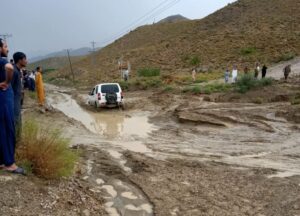
Monsoon Rains Cause Widespread Flooding in Balochistan
Dera Murad Jamali / Quetta: Heavy monsoon rains are causing devastation across Balochistan, with flash floods washing away homes, roads, and infrastructure in regions such as Ziarat, Zindra, Kawas, and Quetta. The relentless downpours have displaced hundreds, and the threat of urban flooding in Quetta grows as more rainfall is predicted.
On Tuesday, intense rainfall led to flooding in Jhal Magsi, Ziarat, and other parts of Balochistan. In Sibi, the flooding breached protection dykes, causing rivers and seasonal streams to overflow and destroy homes, leaving many families homeless. Similar destruction has occurred in Bolan and Kachhi districts.
Ziarat Valley has been hit hard, with heavy rain causing the Kawas and Zindra dams to overflow. Authorities opened the spillways to prevent dam breaches, inundating vast areas of Zindra town. Dozens of mud houses were damaged or destroyed, forcing residents to flee for safety. The main road linking Ziarat to Quetta and other regions has been washed away, severing the area’s connection to the outside world and leaving residents stranded without essential services.

In Ziarat district, floodwaters have entered the main bazaar in the Cheena area, damaging shops and markets, and disrupting local commerce. Balochistan Food Minister Noor Muhammad Dummar confirmed the widespread destruction, noting significant losses in the Harnai area as well. In Jhal Magsi, floodwaters from seasonal streams have damaged roads, isolating the local population. Deputy Commissioner Syed Rehmat Ullah Shah reported that the downstream areas of Jhal Magsi and Gandawah are still threatened due to the continued rainfall, exacerbating an already dire situation.
Awaran district is facing similar challenges, as heavy rains have cut off land links between all tehsils and the district headquarters, severely affecting communication. The Cheel bridge in Awaran has been washed away, and flash floods have damaged link roads and taken out PTCL wires, further disrupting communication and emergency response efforts. Deputy Commissioner Ayesha Zehri reported that there is currently no road link between Gishkor and Turbat due to heavy rains, emphasizing the need for immediate relief and rehabilitation efforts to restore connectivity and provide aid to those in need.
Quetta, the capital of Balochistan, is on high alert as the threat of urban flooding looms. The city’s drainage systems are inadequate to handle such heavy rains, making urban areas particularly vulnerable. With more monsoon rains predicted, the Provincial Disaster Management Authority (PDMA) and local administrations are being urged to launch immediate relief and rescue operations. The priority is to provide temporary shelters, food, and medical assistance to those displaced by the floods.
The ongoing disaster highlights the urgent need for comprehensive flood management and infrastructure resilience plans in Balochistan. Climate change continues to alter weather patterns, and the region must prepare for more frequent and intense weather events. While local authorities and humanitarian organizations work tirelessly to provide relief, the scale of the disaster requires coordinated efforts and long-term solutions to prevent future tragedies.
In conclusion, the heavy rains and resulting floods have exposed the vulnerabilities of Balochistan’s infrastructure and communities. As Quetta faces the threat of urban flooding, swift and decisive action is necessary to mitigate the impact and safeguard the lives and livelihoods of the people in the region.